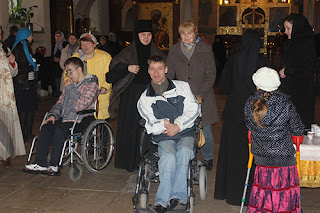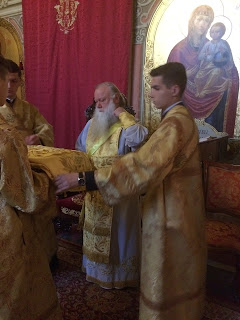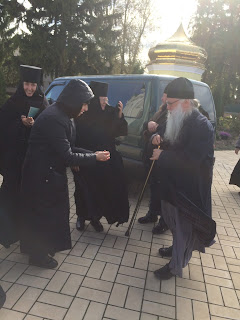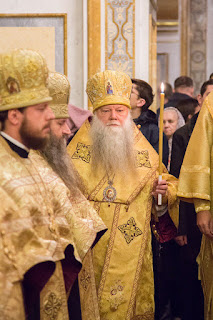Certainly our first reaction is likely to be something along the lines of “we are not chasing anyone away.” That is true. Undoubtedly true. We ARE a welcoming community. There is no doubt about that. We are welcoming to those like us and those not like us from a social, racial, ethnic, political, and pretty much any other point of view. But not with those who have special needs, mental illness, cognitive challenges, etc. Does this mean we hate them? I have no doubt that we do NOT hate them. Not by any means. But let's be honest with ourselves: we just don't know what to do with these people. Or their children. Or their adult children. We don't know and thus we hope that if we ignore the problem it will solve itself. That is not going to happen. Passivity is not going to ensure anything except that we are excluding many from the Lord's Kingdom. That cannot be. We must affirmatively welcome all – and find a place for all.
It is not easy to deal with people with special needs. It can be scary sometimes, although these folks are very rarely violent. But they are different. They are not like us. And since we have little or no exposure to these kinds of people we don't know what to do. And they can be loud. Or act out. Or fidget. Or not sit still. Or act in any number of ways differently than the expectations we have for our faithful during the solemnity of the Divine Services.
So what do we do? Allow chaos to reign during the Divine Services? That obviously won't work. But can we have some compassion, some understanding, some flexibility? I cannot answer for anyone else. I can say, however, that I feel as the parish priest I need to do more. And I can also say that part of my job as the parish priest is to challenge the parish family to grow spiritually. Thus, I'm going to jump to the next pronoun and state that WE need to do more.
 The Lord said: “They that are whole need not a physician; but they that are sick.” You can find that in Matthew 9, Mark 2, and Luke 5. It is true that He said this in the context of repentance. We have often used the same metaphor as the Holy Fathers: the Church is a Spiritual Hospital. We are all sick. Why is it that we accept some (mostly hidden, often denied) illnesses as OK for church attendance and relegate others to banishment from the temple? The Lord also said: “Go ye therefore, and teach all nations, baptizing them in the name of the Father, and of the Son, and of the Holy Spirit: Teaching them to observe all things whatsoever I have commanded you: and, lo, I am with you always, even unto the end of the world. Amen.” That is called the Great Commission. We know this as the end of Matthew's gospel. There are related versions of it in Mark, Luke, John, and Acts. We are being called to teach and baptize all. I've read the Great Commission lots of times. It was a pretty important part of my doctoral work, so I've studied it pretty intensely. Nowhere have I read in the Holy Fathers that this can be interpreted as affirmatively excluding those with special needs from the Christian Community.
The Lord said: “They that are whole need not a physician; but they that are sick.” You can find that in Matthew 9, Mark 2, and Luke 5. It is true that He said this in the context of repentance. We have often used the same metaphor as the Holy Fathers: the Church is a Spiritual Hospital. We are all sick. Why is it that we accept some (mostly hidden, often denied) illnesses as OK for church attendance and relegate others to banishment from the temple? The Lord also said: “Go ye therefore, and teach all nations, baptizing them in the name of the Father, and of the Son, and of the Holy Spirit: Teaching them to observe all things whatsoever I have commanded you: and, lo, I am with you always, even unto the end of the world. Amen.” That is called the Great Commission. We know this as the end of Matthew's gospel. There are related versions of it in Mark, Luke, John, and Acts. We are being called to teach and baptize all. I've read the Great Commission lots of times. It was a pretty important part of my doctoral work, so I've studied it pretty intensely. Nowhere have I read in the Holy Fathers that this can be interpreted as affirmatively excluding those with special needs from the Christian Community.I don't have the answer here. Well, maybe better put is that the answer is obvious. It is just not clear to me how we get from where we are now to executing the obviously correct answer. We have to have a ministry for those with special needs. It needs to be authentically Orthodox. It needs to integrate all into the Body of Christ. Those are over-arching strategy sort of statements. That is fine – these must be said. But what are the tactics? How do we execute this strategy so that it is effective in every meaning of that word?
Below are a few blog posts that I read in preparation for writing this note. Clearly we have some legitimate arguments about some of the theology stated or implied in these, but they still give us a very good look into concerns of special needs parents and what some other parishes are doing to execute this important ministry. The point here is not to get you to think like a Protestant – the point is to expose you to the reality of those with kids with special needs – and I think these posts do a good job of that in a broadly Christian context.
What are the Stats on Disability & Church
Why Church Is a Burden for Special Needs Parents {And What You Can Do About It}
Why You Should NOT Welcome My Special Needs Child to Your Church
7 Reasons Why Churches Fail Special Needs Kids
I have some tactics I think can work to get us moving in the right direction. But I'm going to reserve sharing those right now. Why? Because I have found over the years here at St. Vladimir's that if I put a problem out there the parish, which is replete with smart people, the parish often comes up with a better solution than I could have ever concocted myself. So I have my ideas. I'm not going to poison the well of good ideas by sharing mine just yet. Will you share yours? Please comment below. Or send an email to info@stvladimiraami.org. I look forward to this conversation and putting together a solid set of tactics that can serve our strategy of establishing a solidly Orthodox Christian ministry for those with special needs and their families.
Fr. Gregory





















































































































